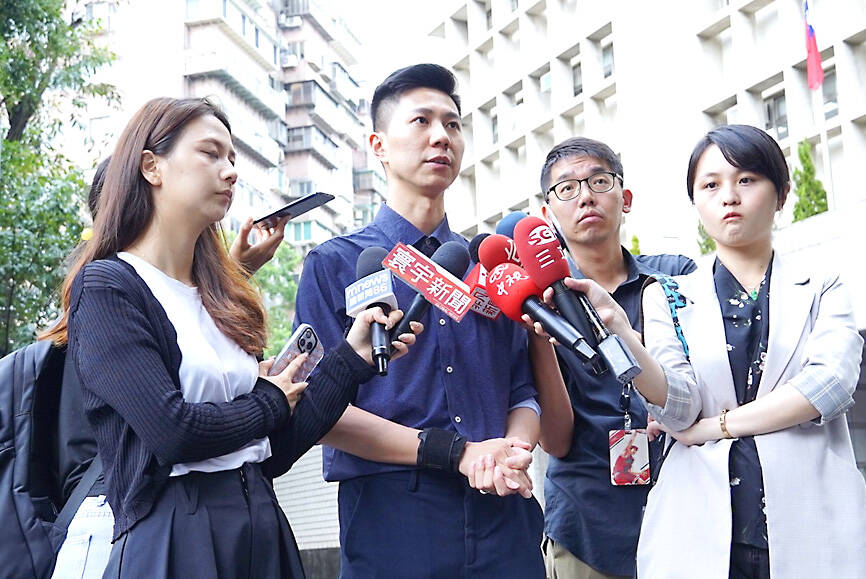The Taiwan People’s Party (TPP) yesterday said it would pursue legal action against people who allegedly fabricated and disseminated a recording of TPP Chairman Ko Wen-je (柯文哲) commenting on Vice President William Lai’s (賴清德) stopovers in the US.
Some media outlets on Wednesday evening received an e-mail with a 36-second audio recording purporting to show “Ko expose the inside story of Lai’s visits to the US.”
In the recording, someone who sounds like Ko, the TPP’s presidential candidate, criticizes Lai, the DPP’s presidential candidate, for his stopovers in New York and San Francisco this month, as he visited Paraguay, and alleges that each person could receive NT$800 for attending Lai’s events.

Photo courtesy of the Taiwan People’s Party
The e-mail said that the recording was made during an internal TPP meeting in the first week of this month.
At a news conference yesterday, TPP spokesman Adam Lee (李頂立) said the voice in the recording was “clearly not Ko.”
The TPP would pursue legal action, but is first investigating who made the recording, how it was made and who disseminated it, he said.
It is also hoped that campaigning would “go back to being clean and transparent,” as people are “sick of mud-slinging,” Lee added.
Lee said that the recording was clearly intended to defame Ko and mislead the public.
Asked about the recording, Ko yesterday, during a visit to Taiwan Cement Corp in Hualien County, said that strange stories are becoming more frequent as the election nears and the use of artificial intelligence (AI) that can imitate people’s voices and appearance makes things worse.
Democratic Progressive Party (DPP) deputy secretary-general Hung Sun-han (洪申翰) said the party hopes the recording was fabricated as the TPP claimed and urged Ko’s office to file a lawsuit against the perpetrators as soon as possible.
If investigated through legal channels, it would show that all political parties — not just the one in power — are affected by misinformation, he said.
By uniting against misinformation and Chinese aggression, the parties can protect the democracy and security that Taiwanese hold dear, he said.
This is not just a case of fake news, but “the beginning of cyberterrorism,” DPP caucus director Liu Shyh-fang (劉世芳) said.
AI-generated and altered media are to become more common, posing an enormous challenge to Taiwan’s democratic society, she said.
Everyone must work to counter misinformation to ensure the stability of elections, Liu added.
Additional reporting by Chen Cheng-yu and Hua Meng-ching

Taiwan has received more than US$70 million in royalties as of the end of last year from developing the F-16V jet as countries worldwide purchase or upgrade to this popular model, government and military officials said on Saturday. Taiwan funded the development of the F-16V jet and ended up the sole investor as other countries withdrew from the program. Now the F-16V is increasingly popular and countries must pay Taiwan a percentage in royalties when they purchase new F-16V aircraft or upgrade older F-16 models. The next five years are expected to be the peak for these royalties, with Taiwan potentially earning

STAY IN YOUR LANE: As the US and Israel attack Iran, the ministry has warned China not to overstep by including Taiwanese citizens in its evacuation orders The Ministry of Foreign Affairs (MOFA) yesterday rebuked a statement by China’s embassy in Israel that it would evacuate Taiwanese holders of Chinese travel documents from Israel amid the latter’s escalating conflict with Iran. Tensions have risen across the Middle East in the wake of US and Israeli airstrikes on Iran beginning Saturday. China subsequently issued an evacuation notice for its citizens. In a news release, the Chinese embassy in Israel said holders of “Taiwan compatriot permits (台胞證)” issued to Taiwanese nationals by Chinese authorities for travel to China — could register for evacuation to Egypt. In Taipei, the ministry yesterday said Taiwan

Taiwan is awaiting official notification from the US regarding the status of the Agreement on Reciprocal Trade (ART) after the US Supreme Court ruled US President Donald Trump's global tariffs unconstitutional. Speaking to reporters before a legislative hearing today, Premier Cho Jung-tai (卓榮泰) said that Taiwan's negotiation team remains focused on ensuring that the bilateral trade deal remains intact despite the legal challenge to Trump's tariff policy. "The US has pledged to notify its trade partners once the subsequent administrative and legal processes are finalized, and that certainly includes Taiwan," Cho said when asked about opposition parties’ doubts that the ART was

If China chose to invade Taiwan tomorrow, it would only have to sever three undersea fiber-optic cable clusters to cause a data blackout, Jason Hsu (許毓仁), a senior fellow at the Hudson Institute and former Chinese Nationalist Party (KMT) legislator, told a US security panel yesterday. In a Taiwan contingency, cable disruption would be one of the earliest preinvasion actions and the signal that escalation had begun, he said, adding that Taiwan’s current cable repair capabilities are insufficient. The US-China Economic and Security Review Commission (USCC) yesterday held a hearing on US-China Competition Under the Sea, with Hsu speaking on